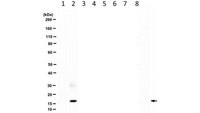MABS1918-25UG Sigma-AldrichAnti-Ubiquitin Lys6 specific Affimer® reagent GFP/His tag
Anti-Ubiquitin Lys6 specific GFP/His-tag Affimer® reagent, Cat. No. MABS1918, detects diubiquitin K6-linkage and is tested for use in Western Blotting.
More>> Anti-Ubiquitin Lys6 specific GFP/His-tag Affimer® reagent, Cat. No. MABS1918, detects diubiquitin K6-linkage and is tested for use in Western Blotting. Less<<Recommended Products
Přehled
| Replacement Information |
|---|
| References |
|---|
| Product Information | |
|---|---|
| Format | Purified |
| Presentation | Purified GFP/His-tag Affimer® reagent in buffer containing 100 mM Sodium Phosphate, 150 mM Sodium Chloride, 0.02% Sodium Azide, pH 7.4. |
| Quality Level | MQ200 |
| Physicochemical Information |
|---|
| Dimensions |
|---|
| Materials Information |
|---|
| Toxicological Information |
|---|
| Safety Information according to GHS |
|---|
| Safety Information |
|---|
| Storage and Shipping Information | |
|---|---|
| Storage Conditions | Stable for 1 year at +2°C to +8°C from date of receipt. |
| Packaging Information | |
|---|---|
| Material Size | 25 μg |
| Transport Information |
|---|
| Supplemental Information |
|---|
| Specifications |
|---|
| Global Trade Item Number | |
|---|---|
| Katalogové číslo | GTIN |
| MABS1918-25UG | 04065266020618 |
Documentation
Anti-Ubiquitin Lys6 specific Affimer® reagent GFP/His tag MSDS
| Title |
|---|
Anti-Ubiquitin Lys6 specific Affimer® reagent GFP/His tag Certificates of Analysis
| Title | Lot Number |
|---|---|
| Anti-Ubiquitin Lys6 specific Affimer® reagent GFP/His tag - Q3666877 | Q3666877 |













